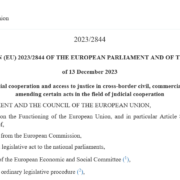Turning Point: China First Recognizes Japanese Bankruptcy Decision
This post is written by Guodong Du and Meng Yu and published at China Justice Observer. It is reproduced here by kind permission of the authors.
Key takeaways:
- In September 2023, the Shanghai Third Intermediate People’s Court ruled to recognize the Tokyo District Court’s decision to commence civil rehabilitation proceedings and the order appointing the supervisor ((2021) Hu 03 Xie Wai Ren No.1).
- This marks not only the first time that China has recognized a Japanese court’s decision in a bankruptcy procedure, but also the first time that China has recognized a Japanese judgment.
- The case establishes a legal precedent for cross-border bankruptcy decisions, demonstrating that prior non-recognition patterns between China and Japan in civil and commercial judgments may not apply in such cross-border scenarios.
- While not resolving the broader recognition challenges between the two nations, this acknowledgment sends a positive signal from the Chinese court, hinting at potential future breakthroughs and fostering hope for improved legal cooperation.

